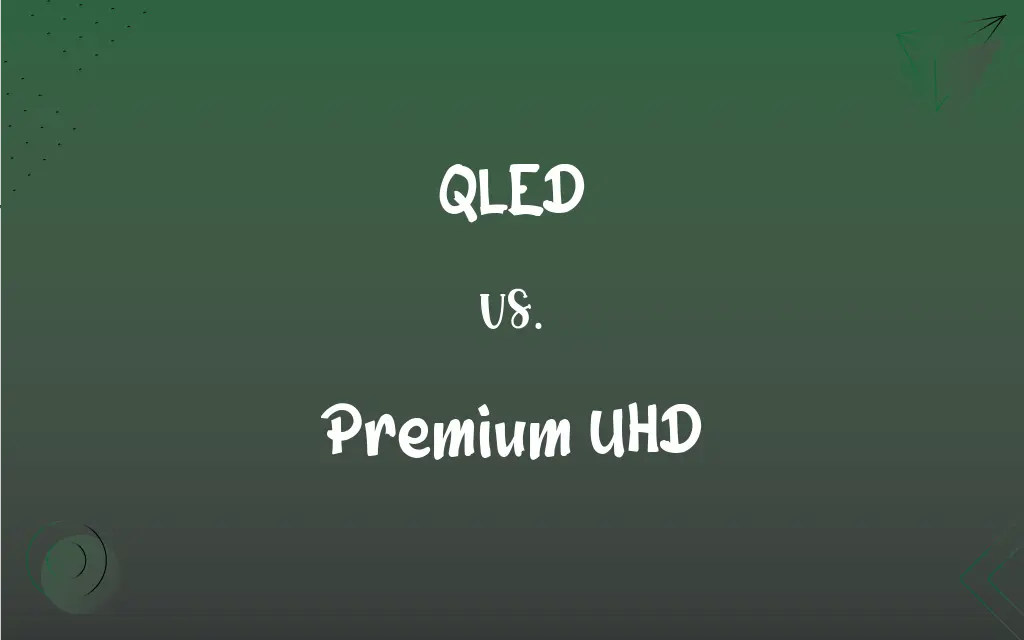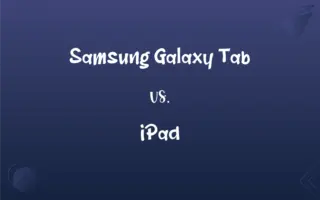QLED vs. Premium UHD: What's the Difference?
Edited by Aimie Carlson || By Janet White || Published on May 20, 2024
QLED is a display technology using quantum dots for enhanced colors and brightness, while Premium UHD refers to high-resolution TVs with advanced features for picture quality.

Key Differences
QLED, or Quantum-dot Light Emitting Diode, technology focuses on enhancing the brightness and color spectrum of the display using quantum dots. Premium UHD, on the other hand, stands for Ultra High Definition, emphasizing a resolution four times higher than standard HD, along with HDR (High Dynamic Range) for better contrast and color depth.
QLED technology primarily enhances color accuracy and vibrancy through its quantum dot layer, Premium UHD TVs concentrate on delivering a resolution of at least 3840x2160 pixels. The distinction lies in QLED’s ability to produce a wider range of colors and higher brightness levels compared to traditional LEDs, whereas Premium UHD defines overall image clarity and detail.
QLED TVs often come with Premium UHD certification, which indicates that they not only utilize quantum dot technology but also meet specific standards for resolution, color, and HDR performance. This integration showcases how QLED enhances the viewing experience within the framework of Premium UHD specifications.
Considering the user interface and smart features, both QLED and Premium UHD TVs offer advanced connectivity and streaming capabilities. However, the emphasis with QLED is on the quality of the display technology itself, while Premium UHD also includes criteria for input lag and color gamut, ensuring a high-quality viewing experience for all types of content.
The energy efficiency of QLED versus Premium UHD varies, with QLED TVs generally consuming more power to achieve their brighter displays and more vibrant colors. In contrast, Premium UHD focuses on delivering high resolution and HDR without specifically addressing the technology used to achieve these features, which can influence their energy consumption differently.
ADVERTISEMENT
Comparison Chart
Technology
Uses quantum dots for enhanced colors and brightness.
Focuses on high resolution and HDR for better detail and contrast.
Color & Brightness
Superior color volume and peak brightness.
High dynamic range for better contrast, without specific tech for color enhancement.
Resolution
Often supports 4K, not defined by resolution.
Defined by 4K UHD resolution (3840x2160 pixels) standards.
HDR Compatibility
Typically offers advanced HDR features.
Must meet specific HDR standards for certification.
Energy Consumption
Potentially higher due to brightness and color technologies.
Depends on the implementation, not specifically tied to the display technology.
ADVERTISEMENT
QLED and Premium UHD Definitions
QLED
QLED is a display technology that uses quantum dots to enhance brightness and color.
The QLED TV brought the movie to life with its vibrant colors.
Premium UHD
Premium UHD refers to Ultra High Definition TVs with advanced features for superior picture quality.
The Premium UHD television offers an immersive viewing experience with its detailed images.
QLED
QLED technology enables TVs to cover a broader color spectrum and achieve higher peak brightness.
Watching nature documentaries on a QLED TV is like looking through a window.
Premium UHD
Premium UHD televisions often come with smart features and connectivity options for enhanced usability.
Our Premium UHD TV seamlessly connects to the internet and streams 4K content.
QLED
QLED displays are energy-efficient while providing brighter and more colorful images.
Despite its bright display, the QLED TV consumes surprisingly little energy.
Premium UHD
Premium UHD standards ensure viewers receive a minimum level of clarity, color, and brightness.
Premium UHD certification guarantees a high-quality picture for all types of content.
QLED
QLED stands for Quantum-dot Light Emitting Diode, offering superior picture quality.
QLED screens are known for their durability and color accuracy.
Premium UHD
Premium UHD TVs are characterized by their 4K resolution and capability to display HDR content.
Watching sports on a Premium UHD TV feels like you're actually at the game.
QLED
QLED TVs utilize a quantum dot filter between the LED backlight and the LCD layer to improve the viewing experience.
The quantum dot filter in QLED TVs ensures the most realistic colors possible.
Premium UHD
Premium UHD technology includes support for a wide color gamut and high dynamic range.
The movie's dark scenes were incredibly detailed on our Premium UHD TV.
FAQs
Is there a difference in resolution between QLED and Premium UHD TVs?
Premium UHD specifically refers to 4K resolution, while QLED focuses on color and brightness regardless of resolution.
What does Premium UHD stand for?
Premium UHD stands for Ultra High Definition, indicating high-resolution TVs with advanced features.
Do all QLED TVs qualify as Premium UHD?
Not all, but many QLED TVs meet Premium UHD standards by combining quantum dot technology with 4K resolution and HDR.
How does HDR performance compare between QLED and Premium UHD TVs?
QLED TVs often have superior HDR performance due to their high brightness and color volume, while Premium UHD TVs must meet specific HDR standards.
Can Premium UHD TVs use quantum dot technology?
Yes, some Premium UHD TVs use quantum dot technology to enhance their color and brightness, similar to QLED TVs.
What is QLED?
QLED is a display technology that enhances color and brightness using quantum dots.
Are there significant price differences between QLED and Premium UHD TVs?
Prices vary based on brand and features, but QLED TVs can be more expensive due to their advanced display technology.
Can I watch HDR content on both QLED and Premium UHD TVs?
Yes, both types of TVs support HDR content, offering enhanced contrast and color detail.
Which technology is better for gaming, QLED or Premium UHD?
Both are suitable, but QLED may offer a slight edge in color vibrancy and brightness, enhancing gaming visuals.
How does the viewing angle compare between QLED and Premium UHD TVs?
Viewing angles can vary, but generally, QLED TVs have improved their viewing angles to match those of Premium UHD TVs.
Can QLED TVs display Premium UHD content?
Yes, QLED TVs can display Premium UHD content, offering enhanced resolution and color.
What are the main benefits of QLED over traditional LED TVs?
QLED offers enhanced brightness, a wider color spectrum, and better overall picture quality compared to traditional LEDs.
What kind of content is best viewed on a QLED TV?
Vibrant and colorful content, such as nature documentaries and animated films, is best viewed on a QLED TV.
Do I need special cables to connect devices to a QLED or Premium UHD TV?
For the best quality, use HDMI cables that support 4K resolution for both QLED and Premium UHD TVs.
Is Premium UHD the same as 4K?
Yes, Premium UHD refers to the highest standard of 4K resolution, along with additional features like HDR.
What warranty period is typical for QLED and Premium UHD TVs?
Warranty periods vary by manufacturer but are typically similar for both QLED and Premium UHD TVs.
Do QLED TVs require more power than Premium UHD TVs?
QLED TVs might consume more power to achieve higher brightness levels and color volume.
Are there environmental considerations for choosing between QLED and Premium UHD?
QLED TVs may use more energy, but both technologies aim to be more energy-efficient than previous generations.
Are Premium UHD TVs good for watching sports?
Yes, the high resolution and fast refresh rates of Premium UHD TVs make them ideal for watching sports.
Can QLED and Premium UHD TVs improve the quality of non-4K content?
Yes, both types of TVs have upscaling technology to improve the picture quality of non-4K content.
About Author
Written by
Janet WhiteJanet White has been an esteemed writer and blogger for Difference Wiki. Holding a Master's degree in Science and Medical Journalism from the prestigious Boston University, she has consistently demonstrated her expertise and passion for her field. When she's not immersed in her work, Janet relishes her time exercising, delving into a good book, and cherishing moments with friends and family.
Edited by
Aimie CarlsonAimie Carlson, holding a master's degree in English literature, is a fervent English language enthusiast. She lends her writing talents to Difference Wiki, a prominent website that specializes in comparisons, offering readers insightful analyses that both captivate and inform.






































































